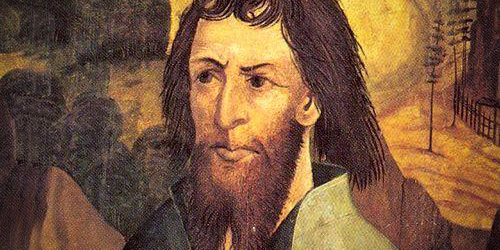An illiterate Swiss peasant in the 15th century couldn’t be expected to amount to much, but St. Nicholas von Flüe was no ordinary man. Born to a wealthy peasant family in 1417, von Flüe was a pious child. Once grown he spent 16 years in the army, fighting with a sword in one hand and a rosary in the other. A strong soldier, he never inflicted more harm than was strictly necessary and even convinced an army not to burn a church in which civilians were taking refuge.
When not at war, Nicholas worked the fields around his house, stopping frequently when he was overcome by visions and mystical prayer. He lived a life of fasting and penance and daily led his family in prayer. At 37 Nicholas left military service to serve as judge and counselor, always handing down just sentences whatever the powerful men he offended might think. Their anger he could handle, but he was unprepared to endure his just judgments being overturned because of the influence of the wealthy, and resigned his post rather than continue in a corrupt system.
When he was 50 and the youngest of his 10 children was a baby, Nicholas had a vision he could not ignore: a plow horse was eating a lily. Nicholas knew immediately that this was symbolic of his worldly duties overcoming his life of prayer. Despite his personal habit of praying while at work and even spending whole nights in prayer, Nicholas knew that he wasn’t living up to the call God had placed on his heart.
Together, he and his wife Dorothy discussed the desire of his heart: to live as a hermit and spend his days entirely in prayer. A holy woman who wanted nothing more than to support her husband in doing God’s will, Dorothy somehow found the strength to agree to his plan, though it broke her heart. Documents were drawn up declaring her the head of the family and Nicholas was off, never to live with his wife and children again.
But God is sometimes gentle with his dear ones, and the separation was not to be complete. Though Nicholas set off on a long journey, he got no farther than the next town, where it seemed to him that God was calling him to build his hermitage. There St. Nicholas, known to the Swiss as “Brother Klaus,” lived for 20 years, his fame growing as his hermitage became a place of pilgrimage, particularly for those who, making the Camino de Santiago, stopped at his home on the route through Switzerland.
Within a few years, the pope offered an indulgence to those who visited him; pilgrims ranged from peasants to the emperor himself, all eager to hear the counsel of this illiterate man who advised kings and paupers. Nicholas prayed most of the night, meditating particularly on the Passion of Christ, but received visitors each afternoon. Among the faithful who visited regularly were his wife and children who attended Sunday Mass with Nicholas each Sunday and stayed to ask his counsel.
For the last 19 years of his life, Nicholas survived entirely on the Eucharist. This fast lent him a strength that made it possible for him to influence the state of the world even from his cell. Toward the end of his life, he sent messages to warring religious factions within Switzerland and brokered a peace agreement that earned him the title “Father of Modern Switzerland.” It was his faithfulness, his willingness to live for God whatever the cost, that made possible the peaceful nation of Switzerland.
After a lifetime of prayer and hard work, St. Nicholas von Flüe (whose feast day is celebrated March 21) died at the age of 70 surrounded by his wife and children, who, in the end, he never truly left. He is a powerful intercessor for soldiers and those who hold public office, a man of unquestioned integrity who valued God above all things and so changed the course of history. St. Nicholas von Flüe, pray for us.
More to read: Marthe Robin: Her only sustenance for more than 50 years was the Holy Eucharist

